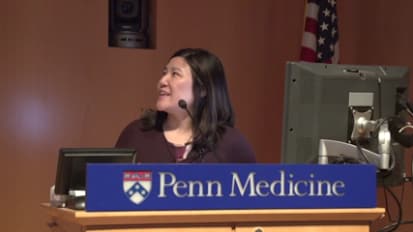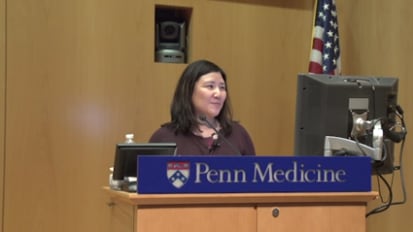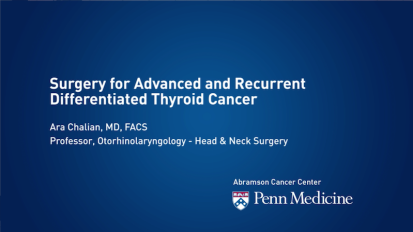
Video
Graves' Disease: Old, Effective and New Treatments
Published: June 20, 2022
View Video chevron_rightFeatured Videos |view more
 Video
Video
Graves' Disease: Old, Effective and New Treatments
This one-hour webinar features a comprehensive case-based discussion covering Graves’ Disease. The panel features a multidisciplinary team of experts from endocrine surgery, endocrinology, ophthalmology, and nuclear medicine. Learn about ...
 Video
Video
Penn Surgeons Perform World’s First En Bloc Resection of Rare Chordoma Tumor
See how Penn Medicine surgeons removed a rare cervical chordoma en-bloc, using Trans Oral Robotic Surgery (TORS).
 Video
Video
TORS for Head & Neck Cancer Care: Innovative, Minimally-Invasive Surgery Technique Invented at Penn
TransOral Robotic Surgery (TORS) is a minimally-invasive, robot-assisted surgical technique to remove tumors of the mouth and throat that are difficult to reach through traditional surgery.
 Video
Video
Penn Otorhinolaryngology: Innovative Expert Care for Complex Cases
At Penn Otorhinolaryngology – Head and Neck Surgery, we pride ourselves on being able to provide complex care for the most challenging and rare cases.
 Video
Video
Overview of the Diagnosis and Early Management of Thyroid Cancer: Early signs of aggressive disease
Caroline Kim, MD, examines the warnings signs for aggressive and recurrent disease in patients lacking structurally identifiable disease after initial therapy.
 Video
Video
The Management of the Medullary Thyroid Cancer Patient
Caroline S. Kim, MD, reviews the pathology and management of medullary thyroid cancer.
 Video
Video
Surgery for Recurrent Thyroid Cancer: Considerations and Limitations
Surgeon Ara A. Chalian, MD, FACS, reviews the procedures and indications for surgery in the patient with recurrent thyroid cancer.
 Video
Video
Surgery for Advanced and Recurrent Differentiated Thyroid Cancer
Ara Chalian, MD, discusses the role and challenges of surgery in the treatment of advanced and recurrent thyroid cancer.
Penn Medicine News